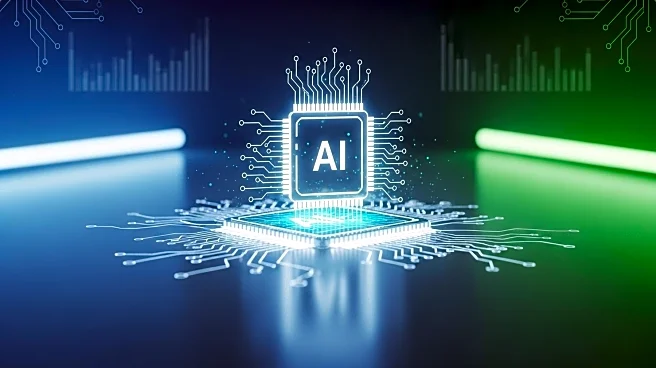What is the story about?
What's Happening?
OpenAI has announced a partnership with Broadcom to produce custom computer chips for its AI data centers. This collaboration aims to reduce OpenAI's dependence on Nvidia and secure sufficient computing power for applications like ChatGPT and Sora. The partnership will enable OpenAI to develop and deploy 10 gigawatts of custom AI accelerators using its own chips and systems. This move follows previous infrastructure deals with AMD and Nvidia, and is part of OpenAI's strategy to enhance its AI capabilities by embedding learned insights directly into hardware.
Why It's Important?
The partnership between OpenAI and Broadcom is significant as it represents a strategic shift in the tech industry towards developing custom chips to meet the growing demand for AI applications. By reducing reliance on Nvidia, OpenAI aims to secure a stable supply of computing power, which is crucial for advancing AI technologies. This move could potentially impact the competitive landscape in the chip manufacturing industry, benefiting companies like Broadcom while challenging Nvidia's dominance. It also highlights the increasing importance of infrastructure in the development of superintelligent AI.
What's Next?
Broadcom is expected to start deploying racks of equipment in the second half of 2026, with the deal set to conclude by the end of 2029. As OpenAI continues to expand its infrastructure, other tech companies may follow suit, further driving the trend of custom chip development. The partnership may also lead to advancements in AI capabilities, offering new benefits for businesses and consumers. Stakeholders in the tech industry will likely monitor these developments closely, assessing their impact on market dynamics and technological innovation.
Beyond the Headlines
The collaboration between OpenAI and Broadcom could have broader implications for the tech industry, including ethical considerations related to AI development and deployment. As AI becomes more integrated into various sectors, questions about data privacy, security, and the societal impact of AI-driven decisions may arise. Additionally, the move towards custom chips could influence global supply chains and manufacturing practices, potentially leading to shifts in economic power and technological leadership.















